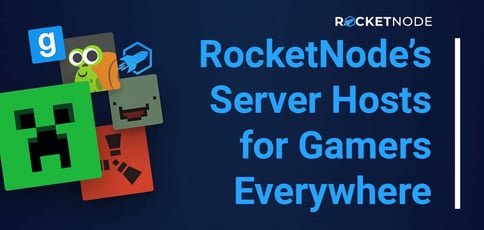
TL; DR: RocketNode is a game server hosting provider that offers features setting it apart from other game server hosts, including DDoS protection and 24/7 support. And its upcoming Kubernetes update promises faster speeds and better security with an encrypted internal network to protect your data from the public. We sat down with Lane Romano, Founder & CEO of RocketNode, so that you can hear it all straight from the source.
Everything lives on the cloud — including your favorite games. Whether it’s World of Warcraft or League of Legends, multiplayer online games depend on a reliable cloud server so that you can create your guild, build what your heart desires, and destroy the enemy team.

The cloud sounds like an inconspicuous Big Brother figure that lives invisibly on your computer or phone. In reality, it refers to a network of remote servers that can process, store, and manage data and applications, including online games — which is when you’d call them game servers. As long as you have an internet connection, you don’t have to physically store precious data on your hard drive.
Gaming servers are usually owned by third-party providers who rent their resources to gaming companies. Among them is RocketNode, a game server host that works directly with well-known games, including Rust, Minecraft, Arma 3, and Unturned to provide reliable servers for game hosts and VPS hosts.
But unlike many other providers, RocketNode does things a little differently.
From Humble Beginnings to a Seven-Figure Game Server Hosting Success
RocketNode sprouted from a unique idea posed by Lane Romano, Founder & CEO, in 2020.
At the time, Lane was a freelance game developer. And like many devs, he referred his clients to game hosting companies when he finished with internal development. But after passing a few thousand clients onto those hosting services, Lane realized he was missing out on business — a lot of it.
RocketNode moved from an idea in 2020 to a side project in 2021 between Lane and some like-minded partners. And despite its infancy, RocketNode has grown to be a huge success and partners with multi-million-player games, such as Minecraft.
“It’s been more than 1,000%-plus growth over the past six months,” Lane said. “I think what really took us from being a smaller side thing to a real thing is when we started doing six figures a month in recurring revenue. That was the breaking point.”
RocketNode has three offices in New York, the UK, and Pakistan, and six datacenters located in the US, Sydney, and soon, Singapore, with hopes to open more eventually. Having several geographically distributed datacenter locations helps reduce ping between players and the game servers.
This means no lagging, no glitches, and plenty of uninterrupted, crystal-clear playtime.
“We could have two nodes in the datacenter light on fire, and our clients won’t notice any downtime.” — Lane Romano, Founder & CEO
Storage, Security, and Best of All, Support
The alliteration of RocketNode’s most prominent USPs probably isn’t on purpose. Still, the once-small company has evolved its offerings to include storage, security, and support that surpasses those of many other game server hosts.
Storage
Redundancy and cloud-based solutions with Kubernetes are two ways to ensure high availability and reliability for applications and data. Redundancy replicates data across multiple storage devices to protect against hardware failures, while cloud-based solutions might use Kubernetes to deploy and manage those applications in the cloud.
RocketNode combines redundancy, cloud-based storage, and Kubernetes to create a resilient and scalable internal infrastructure that can handle spikes in traffic and maintain uptime, even when disruptions occur.
More specifically, RocketNode runs everything on NVMe-based storage — two to seven times faster than SSDs.
“Ceph allows us to basically take full advantage of everything from a performance standpoint without compromising on overall capacity or reliability,” explains Lane. “We could have two nodes in the datacenter light on fire, and our clients won’t notice any downtime because our storage cluster is isolated from our compute cluster.”
Security
More than 80% of data breaches involved some human element, be it manual errors or a lack of training. But again, redundancy can help mitigate these types of security risks.
“Redundancy is huge, and I know a lot of providers underplay it, but then they end up losing clients due to mass data loss,” said Lane.
And that’s why RocketNode works on an encrypted internal network and VPS so no client data releases to the public.
“In terms of DDoS protection and cybersecurity, I’d say we are and will continue to be one of the leading providers,” said Lane. “Someone could go into the datacenter, whack all the servers out, and everything will still be secure.”
Support
With an average response time of 15 minutes, customer service is the icing on the cake.
“What really makes us stand out is our support,” Lane said. “We have three different offices in three different countries, so we constantly have people on staff, 24/7.”
So whether you operate out of Singapore or New York City (or somewhere in between), you can get in touch with RocketNode through Discord, its customer portal, or even the phone line and expect the same high-quality support.
“We’ll always go above and beyond even if the issue is unrelated to the host,” Lane guarantees. “If it has to do with a specific game, we’ll still do our best to get it taken care of.”
The New Kubernetes Line (Literally) Changes the Game
Unless you’ve dipped your toes into the world of software or game development, the odds are good that you’re not incredibly familiar with Kubernetes. Kubernetes is system software that manages containers across multiple servers, making it easier to scale, handle traffic surges, and ensure high availability.
Think of Kubernetes as the captain at the helm of a large vessel. Just as a captain manages a crew to navigate a ship through rough waters, Kubernetes manages a fleet of containers to deploy and run applications. Each container is like a crew member with specific duties, following the captain’s instructions to keep the ship on course.

Naturally, RocketNode relies on the crucial tool of Kubernetes for its game server hosting services. And now, there’s a Kubernetes update coming to light that will soon change how servers respond and, in turn, how gamers game.
“It’s a new way of running our existing services, so there won’t be any real price change,” Lane said. “But we would be one of the only game hosting providers in our niche market to do it.”
The update will give RocketNode an edge because it will give each server a faster internet connection to transfer data at 100 gigabits per second. Plus, servers will be protected from DDoS attacks and can block up to 17 terabits of traffic per second, thanks to a partnership with Path Network.
In other words, games that rely on RocketNode’s hosting services are about to get faster speeds and better security, even if there’s high traffic or unforeseen hardware issues.
The update should roll out over the next two to three months, with Virginia and Texas datacenters among the first stops. In the meantime, check out RocketNode and see how it can transform how your users play.


